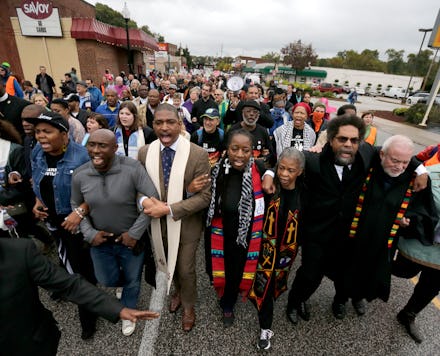If Black America Were Its Own Country, Here's What It Would Look Like

The news: It's been two months since the shooting death of Michael Brown sparked a wave of protests in Ferguson, Missouri, and it's far from dying down. In a resurgence dubbed Ferguson October, thousands of people have gathered in the greater St. Louis area to continue to spotlight police brutality and racial politics in modern-day America.
And while the discussions surrounding Ferguson have been fraught with tension, they have also provided opportunity for a much-needed national conversation about race, specifically regarding the black experience. The Atlantic has come up with a provocative thought experiment to illustrate these underlying sociocultural issues: "What if black America were a country?"
Writer Theodore R. Johnson sifted through data and found a two distinct pictures: "The first is of a strong nation with considerable manpower and purchasing power. The second is of a troubled, fragile state suffering from socioeconomic disparities and structural subjugation in ways that degrade life, liberty, and the pursuit of happiness."
"On some measures, black America resembles countries like Brazil, China, and Russia — emerging powers that are struggling with stark economic inequality," Johnson wrote.
Check out the data below:
When it comes to per capita gross domestic product and population, Black America comes in at less than half that of America as a whole, and ranks 46th in the world. When you look at social and economic disparity, an even more concerning image of black America comes into view. Blacks experience much higher rates of unemployment, poverty and incarceration than the rest of the U.S., and their median household wealth just edges out Palestinians'. In most development criteria, black America lags behind not only the rest of America but much of the developed world.
What does this mean? The data paint a grim picture of a failed state that exists within a supposedly successful one, an uncomfortable reality of one segment of the population falling behind the rest in nearly every measure of development. "This is more than an inconvenient truth; it fundamentally undermines the United States' greatest contribution to humanity: the American idea," Johnson wrote.
When nearly 15% of the population has a distinctly disadvantaged experience compared with the rest of the country, it is past time to examine whether the idea of equality in America is working out.